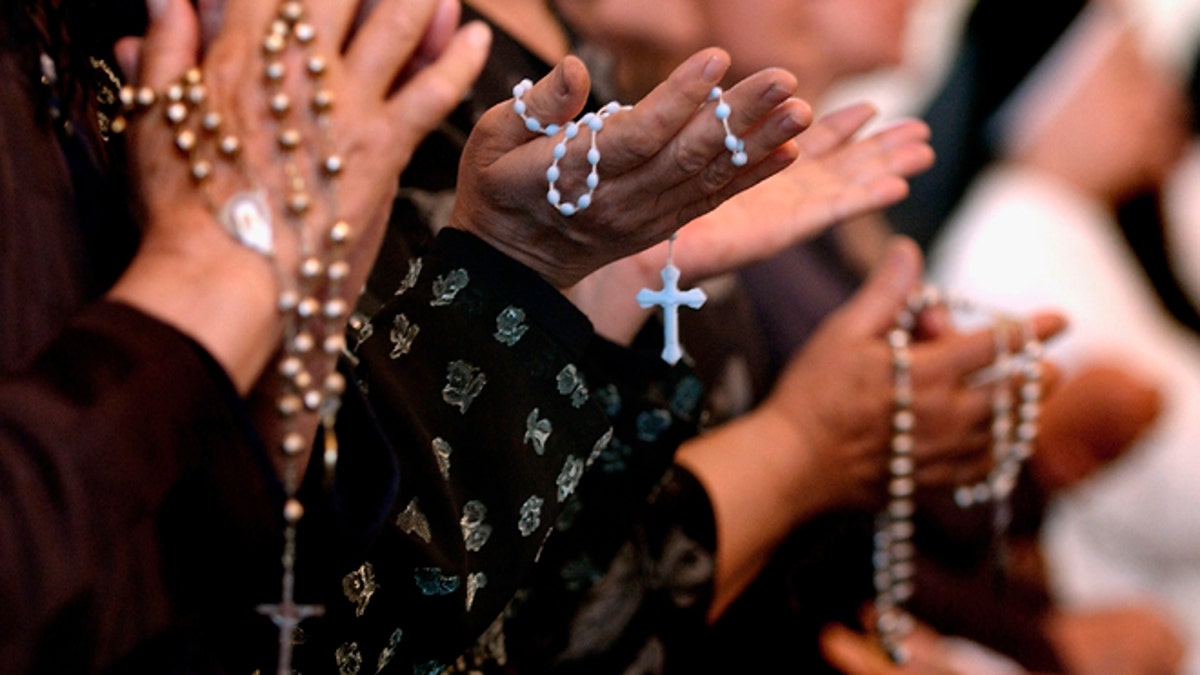
(Photo by Wathiq Khuzaie/Getty Images) (2005 Getty Images)
Catholicism is losing ground in the Hispanic community in the United States, among its most enthusiastic and youngest group of followers, according to a new Gallup Poll.
The number of U.S. Hispanics identifying themselves as Catholics fell in the last five years from 58 percent in 2008 to 54 percent in 2012. Less than half of Hispanics (47 percent) age 18-29 now identify themselves as Catholics, a much lower number than those aged 30 and older. During the same period of time, the number of Latino Protestants rose from 27 percent in 2008 to 28 percent in 2012.
But Catholicism isn’t necessarily losing followers to Protestants in droves, yet — the more urgent culprit for the five-year decline appears to be the growth in the number of young Latinos who have no religious affiliation at all. According to Gallup, 20 percent of 18- to 29-year-old Hispanics have no religious affiliation, fueling the decline in the number of Catholic Latino followers now and, perhaps, into the future.
We are boring. We are failing to give people spiritual nourishment and provide worship service. We need to figure out how to preach a Gospel that is understandable and attractive to people in the 21st century.
“We are boring. We are failing to give people spiritual nourishment and provide worship service,” said Father Tom Reese, Senior Fellow at the Woodstock Theological Center at Georgetown University. “We need to figure out how to preach a Gospel that is understandable and attractive to people in the 21st century.”
That same Gallup poll, released Monday, shows that 60 percent of Latino Protestants consider themselves very religious compared to just 43 percent of the Latino Catholic population. But for what the Latino Protestant community lacks in size (29 percent of 18-29 Hispanics) it makes up in religious fervor and participation. The number of Protestant followers is virtually the same among all age groups.
“These patterns suggest the potential for an increase in the relative or proportionate number of Protestant Hispanics in the years ahead,” the Gallup Poll report read. “If this does happen, and given that Protestant Hispanics are considerably more religious than Catholic Hispanics, this could lead to a higher average level of Hispanic religiosity in future years.”
Reese, former editor of "America," the national Catholic weekly magazine, said Catholic parishes have to do a better job preaching, using good music, developing a better sense of community and programs for kids.
“The Protestant mega-churches and evangelicals understand this,” Reese said. “We can’t just think people are going to come to us, because they came to us in the past.”
Marilyn Santos, president of the National Catholic Network de Pastoral Juvenil Hispana (La Red), an association of Roman Catholic Church organizations and pastoral ministers committed to the evangelization of Hispanic youth in the United States, said assimilation into U.S. culture is partly to blame.
“They are following behind the footsteps of their non-Hispanic adults, choosing not to affiliate with any organized religion,” Santos said.
Santos believes the Catholic church needs to empower young Latinos to be the evangelizers, those that minister and preach to the dynamic growing Latino community. Young Latino evangelizers, she said, can better connect with their followers and help the Catholic church take notice of subtle cultural differences.
It's as simple as the kind of music Latinos listen to in Mass, as well as the language in which they hear their sermons. Santos recalled visiting a national convention in which they translated Catholic songs into Spanish, “but beat-wise and melody-wise it just was so not Latino.” She said she believes a song entirely in English with a Hispanic rhythm would go just as far.
Santos also praised innovative national programs like Theology Untapped, created by Renewal International, which hosts guest speakers and talks for young Catholics at restaurants and bars with free food and beer.
This is a far cry from the old “lazy monopoly” Catholic school of thought that has fueled the surge of Protestant and evangelical followers in Latin America, Reese explained, and in some of the immigrant Latino communities in the United States.
Evangelicalism has made major inroads in Brazil, the country with the most Catholics in the world with 126 million, according to the Brazilian 2010 Census. Forty years ago, 92 percent of the Brazilian population was Catholic. In 2000, that number dropped to 74 percent and in 2010 it was about 65 percent.
Observers point to those numbers as a significant reason why cardinals gathering for conclave in March should choose a pope from developing nations like Latin America or Africa to help usher in a new day for Catholicism.
"In the last two conclaves they elected the smartest man in the room. This time they ought to elect the man who will listen to all the smart people in the room," Reese told Fox News Latino. "I want a diplomat, someone who is good at consensus building because we need all the best minds in Rome working together."
Follow us on twitter.com/foxnewslatino
Like us at facebook.com/foxnewslatino
